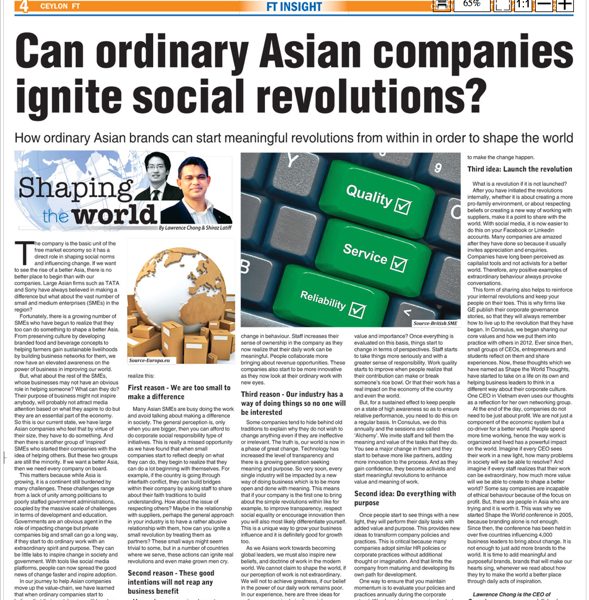The company is the basic unit of the free market economy so it has a direct role in shaping social norms and influencing change. If we want to see the rise of a better Asia, there is no better place to begin than with our companies. Large Asian firms such as TATA and Sony have always believed in making a difference but what about the vast number of small and medium enterprises (SMEs) in the region?
Fortunately, there is a growing number of SMEs who have begun to realise that they too can do something to shape a better Asia. From preserving culture by developing branded food and beverage concepts to helping farmers gain a sustainable livelihoods by building business networks for them, we now have an elevated awareness on the power of business in improving our world.
But how about the rest of the SMEs whose businesses may not have an obvious role in helping someone? What can they do? Their purpose of business might not inspire anybody, will probably not attract media attention based on what they aspire to do but they are an essential part of the economy. So this is our current state; we have large Asian companies who feel that by virtue of their size, they have to do something. And then there is another group of ‘inspired’ SMEs who started their companies with the idea of helping others. But these two groups are still the minority. If we want a better Asia, then we need every company on board.
This matters because while Asia is growing, it is a continent still burdened by many challenges. These challenges range from a lack of unity among politicians to poorly staffed government administrations, coupled by the massive scale of challenges in terms of development and education. Governments are an obvious agent in the role of impacting change but private companies big and small can go a long way if they start to do ordinary work with an extraordinary spirit and purpose. They can be little labs to inspire change in society and government. With tools like social media platforms, people can now spread the good news of change faster and inspire adoption.
Seeking a strategy and a business model for breakthrough performance?
In our journey to help Asian companies move up the value-chain, we have learned that when ordinary companies start to believe that their work has incredible value and that they can do something to make a difference, their business benefit too. It has nothing to do with starting corporate social responsibility programmes as this requires additional commitment. But it is about doing daily work with an extraordinary sense of meaning and purpose. But it takes a while before ordinary companies even understand the power that they possess in unleashing social revolutions. When asked, here are the 3 reasons why Asian companies don’t realise this:
1st reason – We are too small to make a difference
Many Asian SMEs are busy with doing work and avoid talking about making a difference in society. The general perception is that only when you are bigger then can you afford to do corporate social responsibility type of initiatives. This is really a missed opportunity as we have found that when small companies start to reflect deeply on what they can do, they begin to realise that they can do a lot, beginning with themselves. For example, if the country is going through interfaith conflict, they can build bridges within their company by asking staff to share about their faith traditions to build understanding. How about the issue of respecting others? Maybe in the relationship with suppliers, perhaps the general approach in your industry is to have a rather abusive relationship with them; how can you ignite a small revolution by treating them as partners? These small ways might seem trivial to some but in a number of countries where we serve, these actions can ignite real revolutions and even make grown men cry.
2nd reason – These good intentions will not reap any business benefit
Many ordinary companies choose to remain ordinary, because they believe that the good that they do will not make a difference and more importantly, will not give them any business benefit. This is not true since this is more perception and nothing to do with reality. Whenever we trigger these kind of conversations, about how their company can do ordinary things in an extraordinary way, we always get amazing ideas. And once a number of these ideas get implemented consistently, you start to see a change in behavior. Staff increase their sense of ownership in the company as they now realise that their daily work can be meaningful. People collaborate more bringing about revenue opportunities. These companies also start to be more innovative as they now look at their ordinary work with new eyes.
3rd reason – Our industry has a way of doing things so no one will be interested
Some companies tend to hide behind old traditions to explain why they do not wish to change anything even if they are ineffective or irrelevant. The truth is, our world is now in a phase of great change. Technology has increased the level of transparency and there is a growing generation seeking meaning and purpose. So very soon, every single industry will be impacted by a new way of doing business, that is, to be more open and filled with meaning. This means that if your company is the first one to bring about the simple revolutions within like for example, to improve transparency, respect social equality or encourage innovation then you will also most likely differentiate yourself. This is a unique way to grow your business influence and it is definitely good for growth too.
As we Asians work towards becoming global leaders , we must also inspire new beliefs and doctrines of work in the modern world. We cannot claim to shape the world, if our perception of work is not extraordinary. We will not to achieve greatness if our belief in the power of our daily work remains poor. In our experience, here are 3 ideas for ordinary companies to ignite social revolutions:
1st Idea: See everything in new light
We usually start the conversation by inviting the companies to share about what they do and the perceived impact they have on others. For example, when you ask someone to do something, what does it mean for the person in terms of meaning, value and importance? Once everything is evaluated on this basis, things start to change in terms of perspectives. Staff start to take things more seriously and with a greater sense of responsibility. Work quality starts to improve when people realise that their contribution can make or break someone’s rice bowl, or that their work has a real impact on the economy of the country and even the world.
But for a sustained effect to keep people on a state of high awareness so as to ensure relative performance, you need to do this on a regular basis. In Consulus, we do this annually and the sessions are called Alchemy. We invite staff and tell them the meaning and value of the tasks that they do. You see a major change in them and they start to behave more like partners, adding more innovation to the process. And as they gain confidence, they become activists and start meaningful revolutions to enhance value and meaning of work.
2nd Idea: Do everything with purpose
Once people start to see things with a new light, they will perform their daily tasks with added value and purpose. This provides new ideas to transform company policies and practices. This is critical because many companies adopt similar HR policies or corporate practices without additional thought or imagination. And that limits the company from maturing and developing its own path for development.
One way to ensure that you maintain momentum is to evaluate your policies and practices annually during the corporate retreat. We also advise companies to start internal teams like cultural commissions to ensure that there is a group of internal activists to promote a culture of meaning and purpose. One of our clients which repairs and sell high-end string instruments did this and saw a marked improvement in terms of participation from the staff. This is because once the staff saw that the managing director was serious about supporting innovation, they were more willing to share and commit to make the change happen.
3rd Idea: Launch the revolution
What is a revolution if it is not launched? After you have initiated the revolutions internally, whether it is about creating a more pro-family environment, or about respecting beliefs or creating a new way of working with suppliers, make it a point to share with the world. With social media, it is now easier to do this on your facebook or linkedin accounts. Many companies are amazed after they have done so because it usually invites appreciation and enquiries. Companies have long been perceived as capitalist tools and not activists for a better world. Therefore any positive examples of extraordinary behaviour always provoke conversations.
This form of sharing also helps to reinforce your internal revolutions and keep your people on their toes. This is why firms like GE publish their corporate governance stories so that they will always remember how to live up to the revolution that they have began. In Consulus, we began sharing our core values and how we put them into practice with others in 2012. Ever since then, small groups of CEOs, entrepreneurs and students reflect on them and share experiences. Now these thoughts, which we have named as Shape the World thoughts, have started to take on a life of their own and help business leaders to think in a different way about their corporate culture. One CEO in Vietnam even used our thoughts as a reflection for her own networking group.
At the end of the day, companies do not need to be just about profit. We are not just a component of the economic system but a co-driver for a better world. People spend more time working, hence the way work is organised and lived has a powerful impact on the world. Imagine if every CEO sees their work in a new light, how many problems in society will we be able to resolve? And imagine if every staff realises that their work can be extraordinary, how much more value will we be able to create to shape a better world? Some say companies are incapable of ethical behavior because of the focus on profit. But there are people in Asia who are trying and it is worth it. This was why we started Shape the World conference in 2005, because branding alone is not enough. Since then, the conference has been held in over 5 countries influencing 4,000 business leaders to bring about change. It is not enough to just add more brands to the world. It is time to add meaningful and purposeful brands, brands that will make our hearts sing whenever we read about how they try to make the world a better place through daily acts of inspiration.
Lawrence Chong is the CEO of Consulus, a company specializing in helping Asian firms rebrand and redesign their organizations to be more innovative through business design. Consulus has begun operations in Sri Lanka in partnership with Hummingbird International. Shiraz Latiff is the CEO/Lead Consultant of Hummingbird International, a regional knowledge house specializing in coaching, consulting & outsourcing through global partnerships & collaborations.
This article is part of a weekly column called Shaping the World where Lawrence and Shiraz share insights and ideas about building innovative Asian Brands. It is published by one of the leading dailies in Sri Lanka, Ceylon Today.





